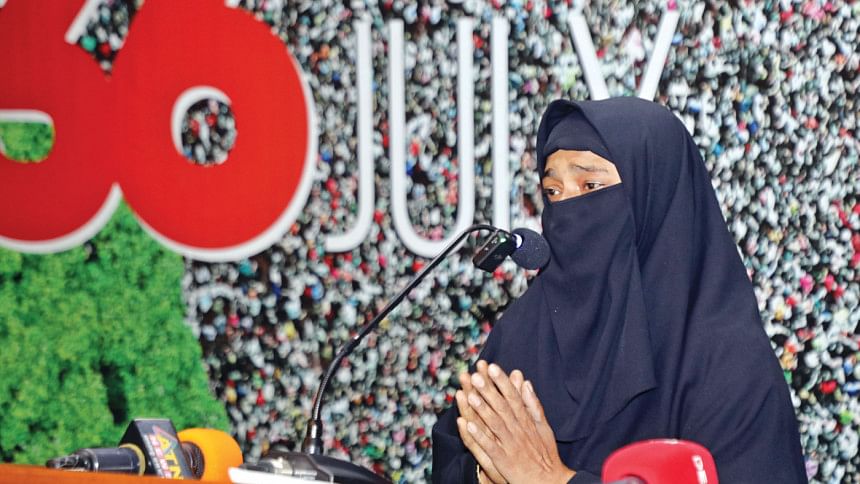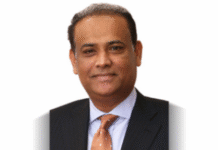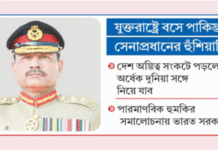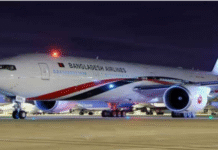
Harmony, reform, remembrance, and justice were the key demands of those who took to the streets and the families of those who laid down their lives during the July uprising.
The injured, families of the martyrs, and protesters yesterday came together at The Daily Star Centre for the inaugural ceremony of a week-long exhibition titled “36 Days of July — Saluting the Bravehearts”.
“I want to tell all the authorities, the police, the military and everyone: You will never again become slaves [to power]. You eat because of us, the general people … so you cannot become slaves ever again,” said Fatema Khatun, mother of Mamun Hossain, a chauffeur who was fatally shot on July 19 on the Mohakhali flyover.
“Do not ever let an autocrat at the helm of the country again. It fills me with disgust to call the former rulers a government,” she said. The words of the woman hailing from Jalial village in Noakhali’s Binodpur thundered through the hall.
When she heard that her son was shot, she sank into deep prayer. “I prayed outside in the courtyard until 3:00am without speaking to anyone. I got the news of his death at 3:45am. At that moment, it began raining, and I truly believe it was a sign of Allah’s blessing … cleansing the country of an autocrat.”
Shamsi Ara Zaman, mother of martyred journalist Tahir Zaman Priyo, said, “We are common people. We do not understand power. The parents of martyrs do not want power, and neither do the injured. They only want some empathy. The media need to focus more on them.”
Criticising some media outlets for enabling the Awami League rule, she said, “The media that helped Sheikh Hasina become more reckless need to be brought back on track.”
She said she did not cry when she heard the news of her son’s death. “To earn freedom, someone or the other’s son must go. I didn’t cry for Priyo, because by then, so many of our children had died.”
Sabrina Afroz Sabonti, elder sister of Mahamudur Rahman Saikot, an HSC student from Mohammadpur Government Model College killed on July 19, said, “We cannot betray the blood of the martyrs in this new Bangladesh. After losing my 19-year-old brother, I found strength in knowing that he was not alone in making sacrifices. My brother was shot dead while trying to save his friend.”
Demanding justice, she said, “When I see the slogan, ‘My brother is in the grave while the killers roam free,’ I can’t keep it together.”
She said it was surreal how someone one eats with, lives with, and grows up with vanishes one day.
Abul Bashar Anik, brother of Mohammed Sajal who was shot on August 5 in Narayanganj’s Chashara, shared how his brother died happy knowing that Hasina had fallen.
“When he regained consciousness on the morning of August 6 after a major surgery, my brother, despite his critical condition, asked me, ‘Did Sheikh Hasina resign?’
“I was annoyed and asked why he was thinking about this in such a state. He still insisted. When I informed him that Sheikh Hasina had resigned and fled, he smiled and said, ‘Alhamdulillah’.
“That was the last smile I saw on his face. He breathed his last that evening,” recalled Anik.
He said the dictator, in a bid to remain in power, opened fire on innocent people, some of whom were in their homes or standing on rooftops. “I demand that those involved in these killings face trial and a Bangladesh free from dictatorship.”
Ainun Nahar’s daughter Naima Sultana, 15, a 10th grader of Milestone School and College in Dhaka, was killed.
“I saw her brain spill out of her skull right in front of my eyes,” she said, speaking to this correspondent at the event.
“During the movement, she used to draw cartoons and caricatures. She wanted to join the rallies … I tried to stop her. She wouldn’t listen. On the afternoon of July 19, she was drawing a flower. Without finishing it, she went to the balcony to bring in some clothes. At that moment, students, being chased, took shelter below our building. The police shot at her and killed her inside her own home.”
Md Abu Sayed, nephew of the martyred Maya Islam, recalled how they were even unable to locate the hospital she was in for a whole day. Maya had been killed when she had stepped outside for a moment to buy her 7-year-old grandson ice cream. Her grandson Musa, who had also been shot, is still in a vegetative state in Singapore.
“We heard she was at Rampura Farazi Hospital, but we couldn’t go there. We were already at the Dhaka Medical College Hospital trying to save Musa. The next day, we found her body at the hospital. Even the ambulance carrying her for burial was attacked on the road,” said Sayeed.
“We are common people. We do not understand power … We only want some empathy.”
Muhammad Imran Hossain, who lost his sight after sustaining injuries in Uttara, said he does not want to become a burden on his family.
“Everyone is busy pursuing their own political goals. I don’t want to be a burden. If proper treatment is provided to the injured, their conditions can improve.
“I live with my aunt after losing my parents in childhood. I couldn’t stay idle at home after witnessing the deaths of my brothers. On July 19, I joined the protests. We asked police not to shoot and to let us protest peacefully.”
Describing a chaotic scene, he said, “Uttara became a war zone. After a loud bang, I fell unconscious … An ambulance was arranged, but the police and Chhatra League didn’t let it pass. I was finally taken to a hospital. Had they not given me IV saline I would have died.”
The exhibition hall at The Daily Star Centre was filled with visitors, each slowly moving from one photo frame to another, examining the news clips and photographs on display.
Among them was Mosharrof Hossain, father of slain journalist Hasan Mehedi. He walked slowly, paying close attention to each frame as if he was searching for something or perhaps someone.
At 3:38pm, Mosharrof stopped. He looked at the framed photo of his son Mehedi.
Mosharrof’s hand trembled as he pointed to the photograph. The photo was of the body of his son on a gurney. The body was riddled with shotgun pellets.
Overcome with emotion, he gently touched the frame as tears streamed down his face.
Slowly, he reached into his pocket and pulled out a small photograph of Mehedi, holding it up to compare. His voice choked with grief.
“This is my son’s photograph … My son Mehedi.”
At the event, student protesters and coordinators urged people to work for national unity.
Masud Rana, a coordinator from Rajshahi University, said, “We need to protect 2024, because if we can’t, we will see more bloodshed. We are all in this fight together for communal harmony. When we see people practising restraint, India tries to incite communal unrest in Bangladesh. They are trying to create divisions that are artificial. We respect sovereignty. Our neighbouring country should do the same.”
Shyamoli Sultana, a student of the University of Liberal Arts Bangladesh, said, “Before talking about reforming the state, we must first talk about reforming ourselves.”
Shyamoli, who played a key role in organising the students of her university, said people must respect the views they oppose because a lack of respect creates divisions.
“It is natural that everyone does not think alike. That does not mean we can disregard or disrespect others’ opinions. Because when you fail to respect others’ views, opportunities open up for certain groups that neither want the country to prosper nor its people to live in peace. They seek to exploit the nation for their own gain. We cannot allow this to happen.”
The people, irrespective of their religion and ideologies, stood united in July, she said.
“But we are now becoming increasingly divided. We must ensure that this division does not persist. We need to be vigilant so that no one takes advantage of the divisions and leads us astray.”
Shahinur Shumi, a coordinator from Eden Mohila College, said the people of Bangladesh haven’t been able to speak freely in the last 16 years. “In 2024, as we strive for a free Bangladesh, we must ensure the freedom to speak, to protest.”
Citing examples of recent incidents of chaos in front of the offices of some media outlets, Shumi said, “The environment for independent journalism is being harmed. In a democratic state, media is the fourth pillar. If the media cannot function independently and publish facts, we will be deprived of the truth.”
People should also think how the judiciary can function independently and the administration freely.
“The more we can reform these aspects, the smoother our journey will be from a fascist structure towards a truly democratic state,” she added.
Sayma Sultana, a student of BRAC University, said the courage and unity she witnessed in people is something that must be preserved forever.
“The success of our movement was not solely due to the students. Our parents, teachers, rickshaw pullers, shopkeepers — everyone contributed. Without them, this achievement might not have been possible.”
Nirab Hasan Shujan, a student of Government Titumir College, said, “Since August 5, we have been entrusted with a great responsibility. We have talked about reforms because there is no liberation without reforms.”
The mass uprising of the 1990s failed solely due to the political parties, he added.
“In 2024, the student community has once again united. We will remain steadfast in one goal: We must ensure that no new fascist force arises.”
Nusrat Tasnim Orna, a volunteer of Loraku 24, spoke about her experiences in working with the injured.
“We helped them, cared for them, and provided services to 91 injured. Sadly, four of them passed away. We also tried to offer financial support to rehabilitate some of them. Because of that, I can now sleep in peace.”
Prof Gitiara Nasreen, who teaches journalism at Dhaka University, urged all to remember the spirit of the movement, come what may.
“We must never forget the long July. The events of 2024 gave us the courage to speak out. Once, people didn’t even dare to utter the word ‘fascist’.
“Even after so much gunfire and violence, people couldn’t be removed from the streets. Those who contributed to the July movement must be remembered. They taught us that change is possible. We must preserve that spirit.”
After visiting the exhibition, Inspector General of Police Baharul Alam said, “Each picture of the exhibition has its own appeal. Every incident intensely hurts and overwhelms. My heart was heavy, and I felt that so much sacrifice should not go in vain. We must move forward.”
Daily Star









